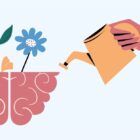Emotions and how we express emotions play an important role in our daily lives. Evolutionary psychologists believe, emotions serve a primal function in helping us navigate and adapt to our ever-changing environment. Emotions shape our attitudes, moods, and behaviours and, in many scenarios, even dictate our success.
There are at least six universal emotions:
- Fear,
- Disgust
- Anger
- Sadness
- Surprise
- Happiness.
Emotions can have a positive effect in promoting inner strength and resiliency. Emotions can also help in establishing social bonds with others.
Emotion theorists believe emotions such as fear, sadness, or frustration serve a functional purpose: they convey certain needs that stimulate corrective action. While some may try to ignore these so-called “negative emotions,” people with high emotional intelligence know all emotions contain important data—and they use that information to their advantage.
Anger, frustration, fear, and other “negative emotions” are all part of the human experience. They can all lead to stress and are often seen as emotions to be avoided or ignored, but they can actually be healthy to experience. It is advisable to face emotions rather than denying them.
These negative emotional states can create extra stress in your body and your mind. This is uncomfortable but also can lead to health issues if the stress becomes chronic or overwhelming.
The idea of “managing” negative emotions is a complex one. It doesn’t mean avoiding them—avoidance coping is actually a form of coping that attempts to do this, and it can often backfire. It also doesn’t mean letting these negative emotions wreak havoc on your life, your relationships, and your stress levels.
Emotion-Focused therapy is one such therapy that attempts to help people look inside themselves and better understand their own emotions. While emotionally focused therapy has a similar name, it differs from EFT. It is an intervention designed to help couples and family members better understand the emotions of significant others in their lives, and the two approaches are separate. Even so, the process of coming to better understand one’s emotions may facilitate better relationships with others.

Emotion-Focused Therapy
Emotion-focused therapy (EFT) is a therapeutic approach based on the premise that emotions are key to identity. According to EFT, emotions are also a guide for individual choice and decision making. This type of therapy assumes that lacking emotional awareness or avoiding unpleasant emotions can cause harm. It may render us unable to use the important information emotions provide.
Therapists qualified in EFT can help people seeking assistance with a range of concerns. These therapists may help people learn to become more aware of their emotions. EFT also allows people to become better at using the information provided by adaptive emotions. People may be better able to cope with and decrease the negative effects of maladaptive emotions.
Emotion schemes are the core concept of EFT. It was developed largely from these theories of human emotion. Emotion schemes are models that outline how emotion can:
- Be experienced physically
- Cause physiologic changes
- Influence thinking
- Guide future action
EFT helps people both accept and change their personal emotion schemes.
What Emotion-Focused Therapy can help with-
- Childhood abuse or neglect
- People who experience anxiety might often feel debilitated by their attempts to reduce fear and worry
- People who experience depression
- Anxiety
- Eating disorders
- Borderline personality
- Interpersonal issues
EFT has also been found to be potentially effective in working with couples in distress.
How does it help
Therapists practising this method take a compassionate, non-judgmental, and reflective approach to listen and question. This allows the person in therapy to come to a better understanding of their emotions.
Goals in Emotion-Focused Therapy:
- Become more aware of emotions
- Learn to welcome, allow, and regulate emotions
- Learn to describe emotions clearly and in detail
- Increase awareness of the multiple layers of emotional experiences and learn to identify the most direct reaction
- Evaluate whether emotions are helpful or unhelpful in various situations
- Learn to use helpful emotions to guide action
- Identify the source of unhelpful emotions
- Learn to change unhelpful emotions
- Develop alternative, healthy ways of coping with situations that often elicit maladaptive emotions
- Form personal scripts that help challenge the destructive thoughts that may be associated with unhelpful or maladaptive emotions
EFT is generally thought to have been successful when the person in treatment has increased awareness of their emotional experience. They may also have an improved ability to regulate emotions and be better able to transform unhelpful emotions.
At Society for Complementary Therapies, we offer a range of therapies to aid in the navigation of emotions. Please book a session with us by calling on our number or writing to us via email.
Here is the range of therapies we offer, customized for individual needs-
- Clinical Hypnotherapy
- Music Therapy
- Tibetan Bowl Therapy
- Biofeedback Therapy
- Couples Therapy
- Foot Reflexology
- Art Therapy
- Sound and Resonance Therapy







Recent Comments